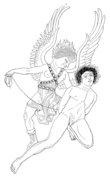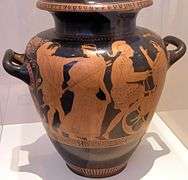Pirithous

In Greek mythology, Pirithous (/ˌpaɪˈrɪθoʊ.əs/; Greek: Πειρίθοος or Πειρίθους derived from peritheein περιθεῖν "to run around"; also transliterated as Perithous) was the King of the Lapiths of Larissa in Thessaly.
| Greek mythology |
|---|
 |
| Deities |
|
|
| Heroes and heroism |
|
| Related |
|
|
Biography
Pirithous was a son of "heavenly" Dia, fathered either by Ixion[1] or by Zeus.[2] He married Hippodamia, daughter of Atrax or Butes, at whose wedding the famous Battle of Lapiths and Centaurs occurred. By his wife, he became the father of Polypoetes[3], one of Greek leaders during the Trojan War. Peirithous was also the close friend of the hero Theseus.
Mythology
Early years
According to Homer, Dia had sex with Zeus, who was disguised as a stallion, and gave birth to Pirithous; a folk etymology derived Pirithous' name from peritheein (περιθεῖν "to run around"), because that was what Zeus did to seduce Dia.
His best friend was Theseus. In Iliad I, Nestor numbers Pirithous and Theseus "of heroic fame" among an earlier generation of heroes of his youth, "the strongest men that Earth has bred, the strongest men against the strongest enemies, a savage mountain-dwelling tribe whom they utterly destroyed". No trace of such an oral tradition, which Homer's listeners would have recognized in Nestor's allusion, survived in literary epic.
In disjointed episodes that have survived, Pirithous had heard rumors about Theseus' courage and strength in battle but he wanted proof. He rustled Theseus' herd of cattle from Marathon, and Theseus set out to pursue him. Pirithous took up arms and the pair met, then became so impressed by each other they took an oath of friendship. They were among the company of heroes that hunted the Calydonian Boar, another mythic theme that was already well-known to Homer's listeners.
Centaurmachy
Later, Pirithous was set to marry Hippodamia (offspring: Polypoetes). The centaurs were guests at the party, but they got drunk and tried to abduct the women, including Hippodamia who was carried off by the iintoxicated centaur Eurytion or Eurytus. The Lapiths won the ensuing battle, the Centauromachy, a favorite motif of Greek art.[4]

Punishment in Underworld
Hippodamia died shortly after Polypoetes' birth[5]. Thus, Pirithous and Theseus pledged to carry off daughters of Zeus. Theseus chose Helen of Sparta and together they kidnapped her when she was 13 years of age and decided to hold on to her until she was old enough to marry. Pirithous chose a more dangerous prize: Persephone herself. They left Helen with Theseus' mother, Aethra at Aphidnae, and traveled to the underworld domain of Persephone and her husband Hades. When they stopped to rest, they found themselves unable to stand up from the rock as they saw the Furies appear before them.
Heracles freed Theseus from the stone, but the earth shook when he attempted to liberate Pirithous.[6] He had committed too great a crime for wanting the wife of one of the great gods as his own bride.[7] By the time Theseus returned to Athens, the Dioscuri (Helen's twin brothers Castor and Pollux) had taken Helen back to Sparta; they had taken Aethra and Physadeia captive, the sister of Pirithous, who became handmaidens of Helen and later followed her to Troy.[8]
The friendship of Theseus and Pirithous acquired homoerotic undertone in Attic comedy, for which Heracles attempted to free them from the rock to which they had been bound together in the Underworld (for having tried to carry off Persephone), he succeeded in freeing only Theseus and left behind his buttocks attached to the rocks—from which Theseus came to be called hypolispos, meaning "with hinder parts rubbed smooth."[9][10]
Pirithous was worshiped at Athens, along with Theseus, as a hero.[11]
In popular culture
- Pirithous appears in the Class of the Titans episode "Recipe for Disaster" voiced by Michael Donovan. His mythology of being trapped in the Underworld and being unable to be freed by Heracles remains unchanged in the series, but it is mentioned that Hades freed Pirithous upon his death.
- Pirithous appears in the video game God of War III voiced by Simon Templeman. His name is spelled Peirithous here. Peirithous is shown as a prisoner of Hades for trying to make off with Persephone. Peirithous offers Kratos to free him in exchange for giving him the Bow of Apollo (though it wasn't revealed how he obtained the Bow of Apollo). Kratos ends up burning him to a skeleton with a Cerberus Mongrel and claims the Bow of Apollo.
Gallery
 Erinnye, den Peirithoos in der Unterwelt bindend (Vasenbild) (circa 1885)
Erinnye, den Peirithoos in der Unterwelt bindend (Vasenbild) (circa 1885).jpg) Theseus and Pirithous abducting Elena by Pelagio Palagi (1814)
Theseus and Pirithous abducting Elena by Pelagio Palagi (1814) Herakles, Theseus and Pirithoos in Hades, with Hermes. (Attic red-figure calyx-krater between circa 450 and circa 440 BC)
Herakles, Theseus and Pirithoos in Hades, with Hermes. (Attic red-figure calyx-krater between circa 450 and circa 440 BC) Theseus and Pirithoüs Clearing the Earth of Brigands, Deliver Two Women from the Hands of their Abductors by Angelique Mongez (1806)
Theseus and Pirithoüs Clearing the Earth of Brigands, Deliver Two Women from the Hands of their Abductors by Angelique Mongez (1806) Theseus leading Helen to a chariot arranged by Peirithoos. Helen's sister, Phoibe (on the right), watches on. Attic red-figure stamnos by Polygnotos, ca. 430-420 BC.
Theseus leading Helen to a chariot arranged by Peirithoos. Helen's sister, Phoibe (on the right), watches on. Attic red-figure stamnos by Polygnotos, ca. 430-420 BC.
References
- ↑ Homer. Iliad, Book 2.741 & 14.17; Pseudo-Apollodorus. Bibliotheca, Book 1.8.2; Eustathius. ad Homer, p. 101.i.
- ↑ Homer. Iliad, Book 14.317.
- ↑ Homer. Iliad, Book 2.740 & 12.129
- ↑ Homer. Odyssey, Book 11.630, 21.296-304; Iliad. Book 1.263; compare with Ovid. Metamorphoses, 12.218 ff
- ↑ Diodorus Siculus, Library of History, 4. 63. 1
- ↑ Pseudo-Apollodorus. Bibliotheca, Book 2.5.12.
- ↑ Virgil, Aeneid, Book 6.393
- ↑ Hyginus, Fabulae, 79 & 92
- ↑ Licht, Hans. Sexual life in ancient Greece. 1994:223
- ↑ Horace. Odes, Book 4.7
- ↑ Pausanias. Description of Greece, 1.30.4; compare with Pseudo-Apollodorus. Bibliotheca, Book 1.8.2; Pausanias. Description of Greece, 10.29.2; Ovid. Metamorphoses, Book 8.566; Pliny the Elder. Naturalis Historia, 36.4
Source
- William Smith. A Dictionary of Greek and Roman biography and mythology. s.v. Peirithous. London (1848).
 This article incorporates text from this source, which is in the public domain.
This article incorporates text from this source, which is in the public domain.